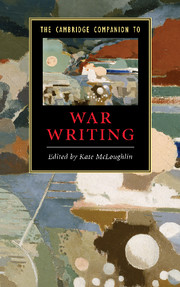7 - Classical war literature
from Part II - Influences
Published online by Cambridge University Press: 28 January 2010
Summary
Introduction
The central text of Greco-Roman literary culture, the Iliad (c.750 BCE), is a poem of battle, and warfare was a constant of political and civic life in antiquity. Perhaps the most famous speech to come down from classical Greece, one of those which Thucydides puts into the mouth of the politician Pericles, is a Funeral Oration for the Athenian fallen of the Peloponnesian War. At Rome, the comitia centuriata, the assembly of the Roman people that elected senior magistrates, met in military order outside the sacred boundary of the city, even though it had ceased to mirror the disposition of actual army units early in the history of the Republic.
The prevalence of war as a theme in classical literature is therefore unremarkable. Equally unsurprising is the impact of classical war literature upon subsequent writing. The modes of engagement between modern and ancient treatments of war are, however, more sophisticated and various than is sometimes supposed. It is true that the most famous moves to appropriate ancient war literature in the service of its contemporary equivalent are also, perhaps, the most straightforward. Such, for example, are the impulses that lead a battle to be dubbed a second Marathon, or, on the other hand, Wilfred Owen to rebut the Horatian claim that it is a sweet and becoming thing to die for one's fatherland in “Dulce et Decorum Est.”
Nonetheless, there is more to the relationship between classical and later war literature than the simple assertion or denial of parallelism between ancient and modern warfare. The writers of classical antiquity were amongst the first to grapple with the problem of how to depict war and its effects.
- Type
- Chapter
- Information
- The Cambridge Companion to War Writing , pp. 71 - 80Publisher: Cambridge University PressPrint publication year: 2009
- 1
- Cited by

